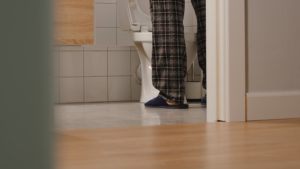
Study author Dr. Satoshi Konno explained, “Our study indicates that if you need to urinate in the night—called nocturia—you may have elevated blood pressure and/or excess fluid in your body. If you continue to have nocturia, ask your doctor to check your blood pressure and salt intake.”
Previous studies have suggested that high salt intake is associated with nocturia, and Westerners tend to consume higher amounts of salt than the Japanese. This may make the Japanese more sensitive to salt, so their blood pressure may rise as a result. These two factors increase the risk of hypertension among the Japanese.
The study looked at the relationship between nighttime urination and high blood pressure among the Japanese population. The study involved 3,749 residents who partook in a health check in 2017. Blood pressure was taken and nocturia was measured through questionnaires. Participants with readings of 140/90 mmHg or higher were prescribed medications.
After adjusting for cofounders, nighttime urination was associated with high blood pressure. The higher the blood pressure, the more trips to the toilets throughout the night.
Dr. Konno added, “We found that getting up in the night to urinate was linked to a 40 percent greater chance of having hypertension. And the more visits to the toilet, the greater the risk of hypertension.”
If you have not been diagnosed with hypertension but have noticed an increase in nighttime urination, it may be an indicator of high blood pressure, and you should speak to your doctor.
In the meantime, regardless of your blood pressure, you should always be mindful of your sodium intake. High salt intake is associated with health problems, so managing how much salt you consume daily is important for all areas of health.